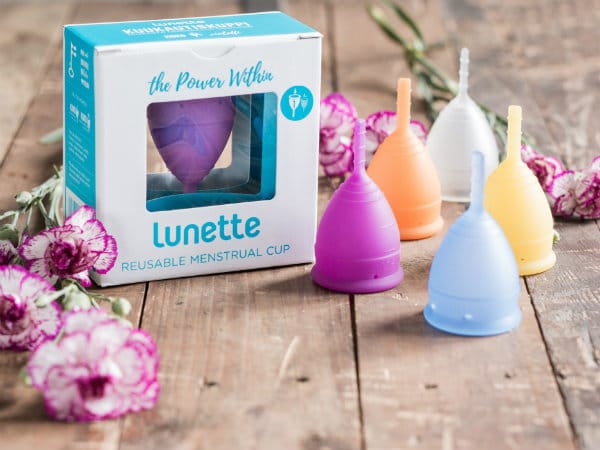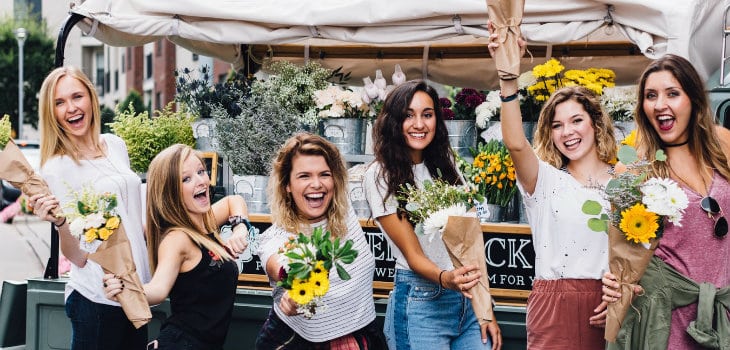A Better Choice for Women: No More Monthly Waste
We worry a lot these days about what goes into our bodies via our mouths, and how to make sure it’s good for us, and for the planet too.
But what about products that enter our bodies, ahem, elsewhere? You may be surprised to learn that feminine hygiene products such as tampons and sanitary pads can take up to a whopping 500 years to decompose.
When you consider that every woman uses about 14,000 tampons and/or pads during their menstruation lifetime, that’s a lot of decomposing going on.
Lessen the landfill
Elizabeth Chapman from Lunette Menstrual Cup says that every cycle in which a woman uses disposable sanitary products results in about one shopping bag full of waste.
“Women use approximately 22 disposable products per cycle, which adds up to between 11,000 and 16,000 per lifetime,” Chapman says. “That’s an awful lot of landfill, and thousands of dollars spent during a woman’s menstruating life.”
The Lunette Menstrual Cup, on the other hand, will last a user 10 years, and cloth sanitary pads last about five.

Chemical hazards
Sydney naturopath Amanda Haberecht, who specialises in reproductive health, says some of the chemicals, plastics and fragrances that are found in conventional sanitary products are not only bad for the environment, but also known hormone disruptors that have been linked to reproductive issues and infertility.
“We read the ingredient list on the foods that we buy, yet we forget to investigate the products that we use in the most delicate part of our bodies,” Haberecht says.
“And, unfortunately, feminine hygiene products are not required to list these toxic ingredients on their packaging.
“It’s important to remember that the skin is the largest organ of the body and toxins that can be absorbed through the skin can easily end up in the blood supply.”
It is not unusual for Haberecht’s patients to report that their period pains diminish when they switch to reusable pads or cups.
“Synthetic products can also trap air flow and blood residue, and are more likely to promote infection and the growth of yeasts such as candida,” she says. “I am heartened to see more and more young women in my clinic who have happily transitioned to the cup.”
Double duty undies
Relatively new to the reusable feminine hygiene market is underwear that comes with built-in sanitary protection.
Kristy Chong, founder of Modibodi period and leak-proof underwear, says disposable pads are made from the equivalent of four plastic bags, and the manufacturing process is resource and chemical intensive.
“Products like Modibodi are a better choice for women and for the environment,” Chong says. “Women save money, never have to worry about running out of protection for those just-in-case moments, and Modibodi gives wearers unparalleled comfort that is not possible with disposable hygiene products.”
Marketing hurdles
While demand for these products is growing, for many consumers, the first thing that needs to happen is a change of mindset. And this is something that the marketplace can help to turn around, by providing information that educates consumers about the benefits of sustainable sanitary care.
“We have all been conditioned to use disposables, so it takes a massive shift in mindset to change that conditioning,” Chapman says.
As Chong points out, the disposable hygiene industry has spent millions of dollars over many years convincing women that their products are the best way to deal with something that women shouldn’t feel embarrassed about.
“Part of our branding and marketing is to encourage women to talk about these issues with each other and to not feel ashamed,” she says.
“Modibodi combines exceptional functionality with desirable looks, which is why we are getting the market uptake. We strongly believe our marketing will help build greater acceptance and lift the image problem.”
Modibodi has recently teamed up with the 1millionwomen climate change movement to raise awareness about sustainable feminine hygiene products.
“By opening the conversation, hosting workshops and featuring articles on their websites and blogs, the health and wellness marketplace can educate women about sustainable products.”
The folks at Lunette are on the same wavelength, having just launched the Sustainable Period Project, an educational resource for high school teachers.
“People will generally use what they have first been exposed to or what their friends use. School is usually their first exposure, and they have traditionally only learnt about disposables. Hence the importance of our Sustainable Period Project — so many people are not even aware that alternatives exist!”
Amanda Haberecht will be speaking at the Naturally Good Practitioner Theatre, early bird passes start from $95.
-
Get your FREE ticket
- REGISTER FOR FREE
